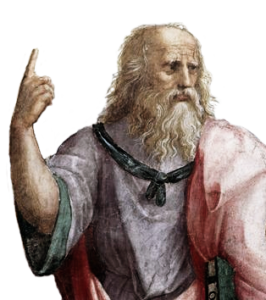Hegel über Platon 010

Parte de:
Lecciones de Historia de la Filosofía [Vorlesungen über die Geschichte der Philosophie] / Primera parte: La Filosofía Griega [Erster Teil: Griechische Philosophie] / Sección Primera: de Tales a Aristóteles [Erster Abschnitt. Von Thales bis Aristoteles] / Capítulo 3: Platón y Aristóteles [Drittes Kapitel: Platon und Aristoteles] / A. Platón [A. Philosophie des Platon]

Tabla de contenidos
Vorlesungen im Atrium Philosophicum §10
Eine andere Schwierigkeit soll die sein: man unterscheidet exoterische und esoterische Philosophie. Tennemann sagt (Bd. II, S. 220): »Platon bediente sich desselben Rechts welches jedem Denker zusteht, von seinen Entdeckungen nur so viel, als er für gut fand, und nur denen mitzuteilen, welchen er Empfänglichkeit zutraute. Auch Aristoteles hatte eine esoterische und exoterische Philosophie, nur mit dem Unterschiede, daß bei diesem der Unterschied bloß formal, beim Platon hingegen auch zugleich material war.« Wie einfältig! Das sieht aus, als sei der Philosoph im Besitz seiner Gedanken wie der äußerlichen Dinge. Die Gedanken sind aber ganz etwas anderes. Die philosophische Idee besitzt umgekehrt den Menschen. Wenn Philosophen sich über philosophische Gegen stände explizieren, so müssen sie sich nach ihren Ideen richten; sie können sie nicht in der Tasche behalten. Spricht man auch mit einigen äußerlich, so ist die Idee immer darin enthalten, wenn die Sache nur Inhalt hat. Zur Mitteilung, Übergabe einer äußerlichen Sache gehört nicht viel, aber zur Mitteilung der Idee gehört Geschicklichkeit. Sie bleibt immer etwas Esoterisches; man hat also nicht [21] bloß das Exoterische der Philosophen. Das sind oberflächliche Vorstellungen.
Praelēctiōnēs in Ātriō Philosophicō §10
Otra de las dificultades con que aquí tropezamos es, según algunos, la que supone el hecho de que se distinga entre una filosofía exotérica y otra esotérica. Tennemann (t. II, p. 220) dice: «Platón hizo uso del derecho que asiste a todo pensador de comunicar solamente aquella parte de sus descubrimientos que consideraba oportuno dar a conocer, y además tan sólo a quienes reconocía la capacidad necesaria para comprenderlos. También Aristóteles tenía una filosofía esotérica y otra exotérica, aunque con la diferencia de que, en éste, la distinción entre ambas era puramente formal, mientras que en Platón era, al mismo tiempo, una distinción material». ¡Qué simpleza! Parece como si el filósofo se hallase en posesión de sus pensamientos al modo como se halla en posesión de las cosas exteriores; pero la idea filosófica es algo muy distinto, y es ella, por el contrario, la que posee al hombre. Cuando los filósofos se explican acerca de un tema filosófico, necesariamente tienen que atenerse a sus ideas; no pueden guardárselas en el bolsillo. Y, aunque se manifiesten exteriormente acerca de algunas cosas, siempre irá implícito en ello la idea, siempre y cuando que la cosa tenga algún contenido. Para comunicar algo puramente externo no se necesita mucho, pero para transmitir a otro una idea hace falta habilidad, y ésta es siempre algo esotérico; por eso los filósofos no son ni pueden ser nunca simplemente exotéricos. Estas no pasan de ser nociones puramente superficiales.
Perge ad initium paginae huius
Lectures at the Atrium Philosophicum §10
Another difficulty is that we have to distinguish between exoteric and esoteric philosophy. Tennemann says (Vol. II, p. 220): “Plato used the same right that every thinker has, to communicate only as much of his discoveries as he thought was good, and only to those whom he believed to be receptive. Aristotle also had an esoteric and an exoteric philosophy, with the only difference being that in the latter the difference was merely formal, whereas in Plato it was also material.” How simple! It looks as if the philosopher were in possession of his thoughts as well as of external things. But thoughts are something quite different. Conversely, the philosophical idea possesses the human being. When philosophers explain philosophical subjects, they must follow their ideas; they cannot keep them in their pockets. Even if one speaks to some people externally, the idea is always contained in it, as long as the matter only has content. It does not take much to communicate, to hand over an external thing, but skill is required to communicate the idea. It always remains something esoteric; one does not have merely the exoteric of the philosophers. These are superficial ideas.
